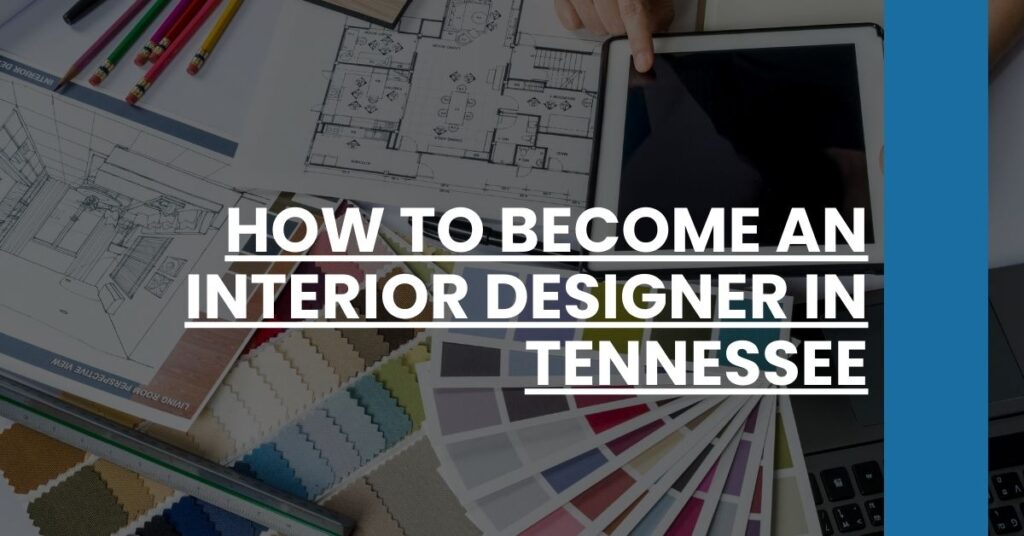Looking for programs in a specific city? Check out our lists of NCIDQ in Nashville, Memphis, Knoxville, Chattanooga, Clarksville, and Murfreesboro.
Want to know how to become an interior designer in Tennessee? This guide provides clear steps to kickstart your journey into this dynamic field.
- Understand educational requirements: Find out what degrees are needed and where to pursue them.
- Learn about licensing and certification: Discover the importance of passing the NCIDQ exam and getting licensed.
- Gain practical experience: Explore ways to build your portfolio through internships and jobs.
Start your path to becoming an interior designer in Tennessee today.
- How to Become an Interior Designer in Tennessee
- Building a Portfolio
- Networking and Professional Development
- Continuing Education and Advanced Certifications
- Exploring Specializations
- Navigating Tennessee’s Interior Design Market
- Starting Your Own Interior Design Business
- Looking for Interior Designer Information On States Bordering Tennessee?
- Conclusion
How to Become an Interior Designer in Tennessee
Becoming an interior designer in Tennessee involves a combination of education, licensing, and experience. Ensure you meet the educational requirements, pass the NCIDQ exam, and build a strong portfolio through internships and job opportunities to establish a career in this dynamic field.
Understanding Interior Design
Interior design focuses on creating indoor spaces that are both beautiful and functional. An interior designer combines elements like furniture, color schemes, lighting, and decorative items to craft environments that meet client needs. This profession extends across residential, commercial, and specialized sectors such as hospitality or healthcare, enhancing comfort and safety through well-thought-out spatial configurations.
Educational Requirements
Pursuing a Degree in Interior Design
To become an interior designer in Tennessee, start with a formal education. You can choose between an Associate’s degree, Bachelor’s degree, or Master’s degree in Interior Design or related fields. Here’s a look at some essential qualifications:
- Associate’s Degree: Provides fundamental knowledge and skills; takes about two years to complete.
- Bachelor’s Degree: Offers comprehensive training and typically takes four years. It covers subjects like design theory, computer-aided design (CAD), and space planning.
- Master’s Degree: Advanced studies for those seeking specialization or higher roles in the industry.
Middle Tennessee State University, the University of Tennessee, and Watkins College of Art offer respected programs that cater to these needs. An accredited degree helps you gain the foundational knowledge required for a successful career and fulfills eligibility criteria for licensing exams.
Importance of Accreditation
Accreditation from legitimate organizations ensures that your program meets industry standards. The Council for Interior Design Accreditation (CIDA) and the National Association of Schools of Art and Design (NASAD) are key accrediting bodies. Graduating from an accredited program boosts your credibility and opportunities for further certifications.
Licensing and Certification
NCIDQ Exam
In Tennessee, interior designers must be licensed, involving the passage of the National Council for Interior Design Qualification (NCIDQ) exam. This exam is crucial for validating your skills and knowledge.
The NCIDQ exam consists of three sections:
- Interior Design Fundamentals Exam (IDFX): Tests basic knowledge and skills.
- Interior Design Professional Exam (IDPX): Assesses more advanced topics like building codes and project management.
- Practicum (PRAC) Exam: Requires practical application of design principles.
To be eligible, candidates need a combination of education and work experience. For instance, a Bachelor’s degree coupled with two years of full-time work experience often meets requirements.
State Registration
Beyond the NCIDQ exam, Tennessee requires interior designers to register with the Tennessee Board of Architectural and Engineering Examiners. Registration ensures that you meet professional standards and allows you to practice legally in the state. You’ll need to submit proof of passing the NCIDQ exam as part of this process.
Gaining Work Experience
Experience is fundamental in building a successful career in interior design. Internships while in school can provide invaluable hands-on experience. Engaging in real-world projects enables you to understand client interactions and project management.
Importance of Internships
Internships are crucial for applying theoretical knowledge in practical settings. You can intern with interior design firms, architecture companies, or furniture manufacturers. These internships expose you to various aspects of the industry, from residential to commercial projects.
- Hands-on learning: Develop practical skills in design software, client communication, and material selection.
- Networking opportunities: Build professional relationships that can lead to job offers and mentorship.
Entry-Level Job Opportunities
Post-graduation, entry-level positions offer deeper exposure and experience. These roles help refine your skills and build a diverse portfolio. Your portfolio is a testament to your practical abilities and creativity.
- Junior Designer: Assist senior designers with projects, drawing, and client presentations.
- Design Assistant: Support in material selection, research, and administrative duties.
Building a solid portfolio during this phase is essential. Leverage each opportunity to document your work meticulously and present it compellingly. This effort will pay off when pursuing advanced roles or starting your interior design business.
Continue exploring this rich profession by delving into other crucial aspects like building a portfolio, networking, seeking advanced certifications, and understanding the local market. Each step brings you closer to a successful career in interior design in Tennessee.
Building a Portfolio
A well-crafted portfolio is essential for interior designers. It is your visual resume, showcasing your creativity, technical skills, and problem-solving abilities.
Portfolio Essentials
Your portfolio should highlight a variety of projects, demonstrating the breadth and depth of your design capabilities. Consider the following elements:
- High-Quality Images: Use professional photos of your completed projects. Ensure they are well-lit and highlight different angles and aspects of the design.
- Sketches and CAD Drawings: Include initial sketches and Computer-Aided Design (CAD) drawings to show your process from concept to completion. This helps potential clients and employers see how you think and work.
- Design Concepts: Showcase the evolution of your ideas. Include mood boards, color palettes, and material samples that contributed to the final design.
- Client Feedback: Add testimonials or feedback from clients to enhance your portfolio’s credibility.
Digital Presence
In today’s digital age, having an online portfolio is crucial. Create a professional website or use platforms like Behance to display your work. An online presence makes it easier for potential clients or employers to find you and view your projects.
Tailoring Your Portfolio
Tailor your portfolio to align with specific job applications or client proposals. Highlight relevant projects that demonstrate your skill set in areas that match the opportunity you are pursuing.
Networking and Professional Development
Networking is key in the interior design industry. Establishing connections with other professionals and staying updated on industry trends can significantly impact your career growth.
Joining Professional Organizations
Consider joining professional organizations such as the American Society of Interior Designers (ASID) or the International Interior Design Association (IIDA). Membership offers several benefits:
- Networking Opportunities: Attend industry events, conferences, and workshops to meet other professionals and potential clients.
- Continued Learning: Access to webinars, courses, and publications to keep your skills and knowledge current.
- Professional Recognition: Enhance your credibility and marketability with a professional designation.
Attending Industry Events
Participate in local design events like Nashville Design Week. These events foster engagement and exposure within the design community. They provide an excellent platform to showcase your work, learn from industry leaders, and stay abreast of new trends and technologies.
Leveraging Social Media
Utilize social media platforms like Instagram, Pinterest, and LinkedIn to connect with other designers, share your work, and attract clients. Consistent and strategic use of social media can significantly boost your visibility and professional reputation.
Continuing Education and Advanced Certifications
Continuing education is vital to stay current with industry trends and best practices.
Importance of Lifelong Learning
The interior design field is constantly evolving. Pursuing further education enables you to adapt to new technologies and methodologies, ensuring your skills remain relevant. The Interior Design Continuing Education Council (IDCEC) offers numerous courses and workshops to help you stay updated.
Advanced Certifications
Earning advanced certifications can set you apart from other designers. Consider specialized certifications such as:
- LEED (Leadership in Energy and Environmental Design): Focuses on sustainable building and design practices.
- WELL Building Standard: Concentrates on creating spaces that promote health and well-being.
These certifications not only expand your knowledge but also increase your marketability, especially in areas with growing demand for sustainable and wellness-focused design.
Exploring Specializations
Interior design offers various specializations that allow you to concentrate on areas of your interest. Specializations enable you to hone specific skills and become an expert in a niche market.
Residential Design
Focusing on homes involves understanding how to create personal, functional, and aesthetically pleasing living spaces. With the real estate boom in cities like Nashville, there’s a growing demand for talented residential interior designers.
Commercial Design
Commercial design includes offices, retail spaces, and restaurants. This specialization requires creating spaces that are not only attractive but also boost productivity and customer satisfaction.
Sustainable Design
Sustainable design is increasingly becoming a prominent field. It involves using eco-friendly materials and practices to create spaces that are efficient and environmentally responsible. Specializing in sustainable design can give you a competitive edge in the market.
Healthcare Design
Healthcare design involves creating environments that enhance patient comfort and facilitate healthcare operations. It requires knowledge of specific regulations and standards. This specialty is particularly relevant given the focus on improving healthcare facilities.
Navigating Tennessee’s Interior Design Market
Understanding the local market in Tennessee is crucial for your success as an interior designer. The state’s diverse regions offer various opportunities across metropolitan areas like Nashville, Memphis, and Knoxville.
Key Employers and Sectors
There are numerous employment opportunities in Tennessee. Key sectors include:
- Design Firms: Work with established firms that handle various projects.
- Architecture Companies: Collaborate on building and renovation projects.
- Furniture Manufacturers: Find roles in product design and space planning.
Trends and Demand
Stay updated on market trends, such as the increasing demand for sustainable design and the impact of technology on interior design. Recognizing and adapting to these trends can guide your career growth.
Real Estate Influence
The real estate boom in Nashville has spurred demand for talented residential interior designers. Understanding housing trends and homebuyer preferences can help you tailor your services and succeed in this vibrant market.
Starting Your Own Interior Design Business
Starting your interior design business in Tennessee can be a rewarding venture. However, it requires careful planning and preparation.
Business Plan Development
Create a comprehensive business plan outlining your services, target market, and financial projections. A well-thought-out business plan is the foundation of your business and guides your strategic decisions.
Legal Requirements
Ensure you meet all legal requirements, including business registration and obtaining necessary permits. Comply with zoning laws and get insured to protect your business.
Marketing Strategy
Building an effective marketing strategy is crucial. Utilize online platforms to showcase your portfolio and attract clients. Networking and client referrals are invaluable for building a strong clientele base. Utilize platforms like Houzz to increase visibility among potential clients.
For more about our services, visit {keyword__keyword_plan__organization__website_url}.
Looking for Interior Designer Information On States Bordering Tennessee?
In addition to Tennessee, we suggest looking for schools in nearby states.
- How to Become An Interior Designer in Kentucky
- How to Become An Interior Designer in Virginia
- How to Become An Interior Designer in North Carolina
- How to Become An Interior Designer in Georgia
- How to Become An Interior Designer in Alabama
Conclusion
Embarking on a career as an interior designer in Tennessee requires a harmonious blend of education, experience, and networking. By understanding the industry requirements, gaining practical experience, and continuously evolving through education and professional connections, you can create a successful and fulfilling career in interior design. Take your first steps today and sculpt vibrant, functional spaces of tomorrow.

